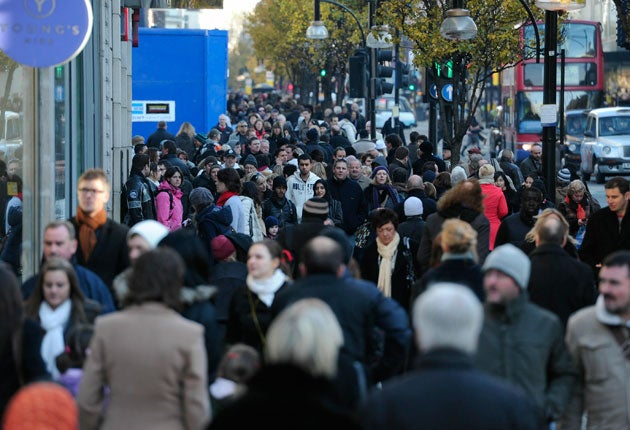Will Christmas prove a final spree for shoppers?
With VAT going up in January and spending cuts expected to bite next year, are Britons likely to hang up their shopping bags in the new year? James Thompson reports

Oh no they won't!
For those arriving in the UK after an extended period away a cursory glance at the business headlines would probably convince them that the country is heading for a double-dip recession as the fragile recovery in consumer spending is derailed.
However, the alternative view held by some large retailers is that 2011 is more likely to resemble the resilient growth of this year than the horror story of plummeting sales and a swath of companies going into administration seen in the three months either side of Christmas 2008. Granted, all retailers say that the first quarter of 2011 is likely to bring challenging trading, given the rise in VAT to 20 per cent on 4 January and continued pressure on household budgets
But the performance of many of the UK's biggest retailers, including the bellwethers Marks & Spencer and John Lewis, has been far better than expected this year and there seem few, if any, signs the wheels are about to come off.
John Lewis, which has 28 department stores and four John Lewis at Home shops, has enjoyed a barnstorming performance for most of this year and is on track for record sales in 2010/11. Its sales jumped by 8.7 per cent to £99.4m for the week ending 27 November. Nat Wakely, director of selling operations at John Lewis, said: "There will be a first-quarter post-VAT blip. But the longer term trend of a slow and steady growth out of recession is the one we would sign up to." He cites "consistent" spending across all its product categories, compared with the dark days of Christmas 2008 when shoppers cut back on everything apart from presents for their children.
"If you take last week, home, fashion and electronics were all growing by between 7 per cent and 11 per cent," Mr Wakely said.
Christine Cross, retail and consumer adviser to the accountancy firm PwC, is also cautious about the first six months of next year but is more upbeat about the second half.
She says: "It is going to be game of two halves." Ms Cross thinks that by mid 2011 there will have been a "relevelling" of prices caused by higher inflation. She hopes that retail initiatives – such as Morrisons' scheme to create 1,000 jobs for homeless and vulnerable people in the next three years – will help to mitigate public-sector job losses.
Indeed, the Government yesterday revised down its forecast for public-sector job losses to 330,000 over the next four years, compared with its June figure of 490,000.
However, rising public sector unemployment is likely to have a bigger impact on the regions than London. Ms Cross says: "There is a little bit of a North-South divide at the moment but I think it will harden. London feels pretty buoyant at the moment, but if you go north of Birmingham it certainly does not feel as buoyant."
Overall, John Lewis's recent performance and the breadth of its customer base suggests a double-dip is unlikely. As Mr Wakely says: "Two-thirds of the UK population shop with us at least once a year."
Oh yes they will!
Any shopkeeper who consumes too much brandy on New Year's Eve may have a nightmare about waking up to a rise in VAT, spiralling commodity prices and a consumer chopping up their credit cards. However, this will be the sober reality they face in January ahead of a year that looks set to be a long, hard slog for the sector.
Jim McCarthy, the chief executive of Poundland, the single-price discount retailer which has performed strongly before, during and after the recession, voices the concerns of many over consumer confidence in 2011.
He says: "We have got a consumer who lacks confidence, given the economy, house-price stagnation and wage increases not keeping up with inflation. When people lack confidence they visit the shops less often and they shop around for value."
Richard Hyman, the strategic retail adviser to the accountancy firm Deloitte, says: "The outlook for next year is that it will be slightly tougher than this year."
He forecasts a fall in total retail spend by value of between 1 per cent and 2 per cent in 2011, which is significant in an industry where the average profit margin is about 6 per cent.
While fashion retailers from Next to New Look have warned that the surge in cotton prices could lead to clothing prices being 8 per cent higher next year, all big retailers face other increases in commodity prices and supply chain costs, such as record freight rates on shipments from the Far East. These costs will largely be passed on to consumers. Mr Hyman said: "We will be importing inflation."
However, Derek Lovelock, the chairman of Aurora Fashions, which owns the Karen Millen, Warehouse, Oasis and Coast fashion chains, is neither downbeat nor upbeat but says 2011 will be "different" to this year.
"We think there is going to be a change in consumer spending behaviour and we are already seeing it. Customers are becoming more discerning and viewing purchasing as an investment. So it is no longer just about price – they want quality, exclusivity and longevity," he says.
"Retailers are going to have to work harder to build and maintain relationships to ensure customer loyalty and continued spend."
Join our commenting forum
Join thought-provoking conversations, follow other Independent readers and see their replies
0Comments